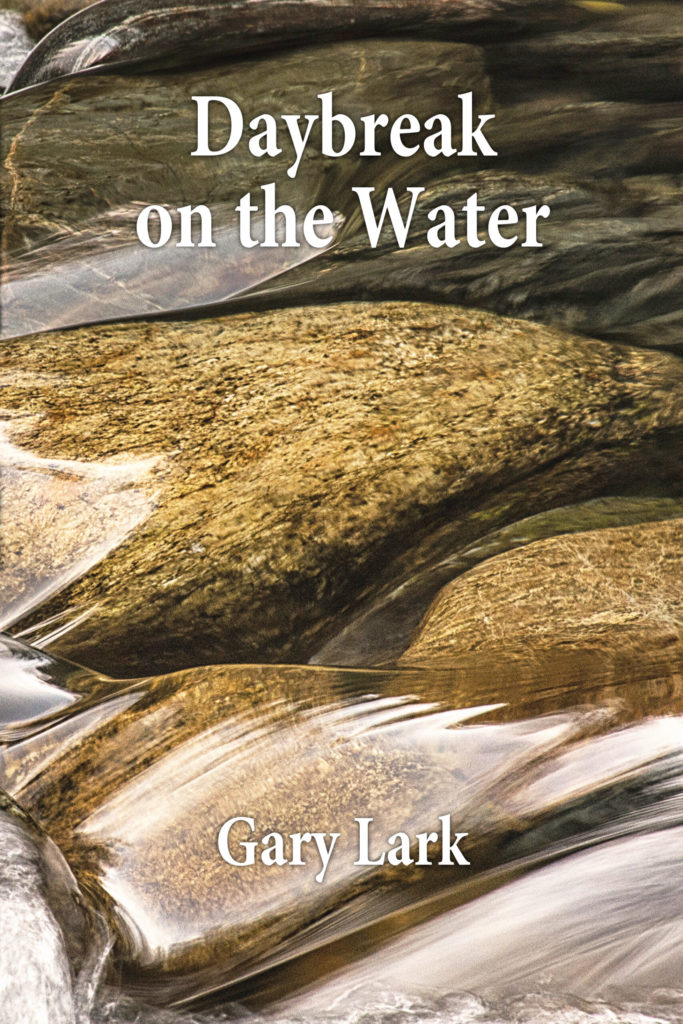
Reviewed by Vince Wixon
Daybreak on the Water by Gary Lark
Flowstone Press, 2020
ISBN: 978-1-945824-39-5
Available at Left Fork Books/Flowstone Press
https://leftforkbooks.com/flowstone/
and Amazon
The epigraph, “I am haunted by waters,” from Norman Maclean’s masterpiece novella, A River Runs through It, prepares readers of Gary Lark’s Daybreak on the Water for a book about fishing and family. As in Maclean’s book, the water is fresh and, in Daybreak’s case, so is the Umpqua River and its tributaries in Southern Oregon where Lark grew up. Water in various locations––rivers, estuaries, the Pacific ocean—runs through all of Lark’s books of poetry. In fact, four of the seven include water in the title: Tasting the River in the Salmon’s Flesh, River of Solace, Easter Creek, and Daybreak on the Water.
“I am haunted by waters” meets its counterpart in the first poem, “Golden Mean,” quoted here in full, and in another poem early in the book, “Copeland Creek.”
To be
at once the mountain
the valley
and the trout
that swims between.
From “Copeland Creek”:
We camped where the creek spills
into the North Umpqua.
I was eight years old
and the river sang.
. . .
There’s a part of me still there
surrounded by enormous trees
the river singing me alive.
Early on readers realize that this will be a devotional book in which the human subject attempts to inhabit and commune fully with his world, and that world is rural: lumber camps, woods, small towns with hard working families—the narrator learning by spending time with adults, fishing the rivers and streams with men and pals. As poet Henry Hughes—a fisherman himself—writes in his blurb for Daybreak on the Water, “We meet many colorful characters—loggers, anglers, clammers, boatbuilders, poachers, sheriffs, sweethearts and old friends.” The events and people in Lark’s poems are written about with authority and grace.
For example, through the easy rhythm and familiarity with terms in the opening of “Phantom, readers are aware they are in the hands of someone who knows what he’s doing.
It was spring going into summer,
after a brief storm, the river up
a bit and milky,
but I was throwing a spinner anyway …
In “Rock Creek Camp”:
On countless mornings
men crawl into a crummy
and head for the show—
to fall, buck and load
the receding timber.
Donkey engines and high leads
winch giant Douglas fir
to the landing
where trucks line up
ready to roll down the mountain.
At a cold sunrise
the whip of the choker cable
can whisper your name.
Lark gives readers just enough about people, their talk, actions, desires, to involve them in the scenes and fill in more themselves.
From “Last Time,” a poem about his father:
He has emphysema and a bad heart valve
the last time we fish the mountain water.
He knows the valve can go anytime,
refuses replacement surgery,
says he’s had enough of that.
. . .
I watch my father catch a fish
before I get to where the rapids tail out.
It’s a big river with fish holding
near the current’s edge, behind rocks
and under shadows, waiting for life
to deliver what it will.
The poem has gone from the specific ailments of the father to a general statement delivered through lovely images about all of us––it’s a big world with us holding on––not having much control––waiting to see what life will bring.
In the final poem in Daybreak on the Water, life brings a “small infinity.”
The fish jump and roll
as I breathe the living air.
I will be here at seventeen
and seventy, life washing
through me, this small infinity.
Former Oregon Poet Laureate Kim Stafford, in a comment on Lark’s book, Easter Creek, puts him in company with “John Prine, Ted Kooser, Edgar Lee Masters.” I would add Oregon treasure Clemens Starck, another poet who writes about working folk with humor, respect, and finely honed details. To end, I want to make it clear that readers don’t have to fish to enjoy these poems and draw meaning from them for their lives. I don’t fish and I read and reread Gary Lark’s poems. They contain music, stories, and wisdom.
Bio:
Vince Wixon’s latest book of poems is Laying By, published by Flowstone Press in 2017. He has coedited four books by William Stafford, including Sound of the Ax, a collection of Stafford’s aphorisms and aphoristic poems, published in the Pitt Poetry Series. In 2014, Vince and his wife Patty received the Stewart H. Holbrook Literary Legacy Award for contributions to the literary life of Oregon. Vince Wixon lives in Ashland.


Vince, great review; so enjoy the poems you’ve selected to show us Gary’s fine collection. Will definitely need to read this one, thank you, Steve Jones